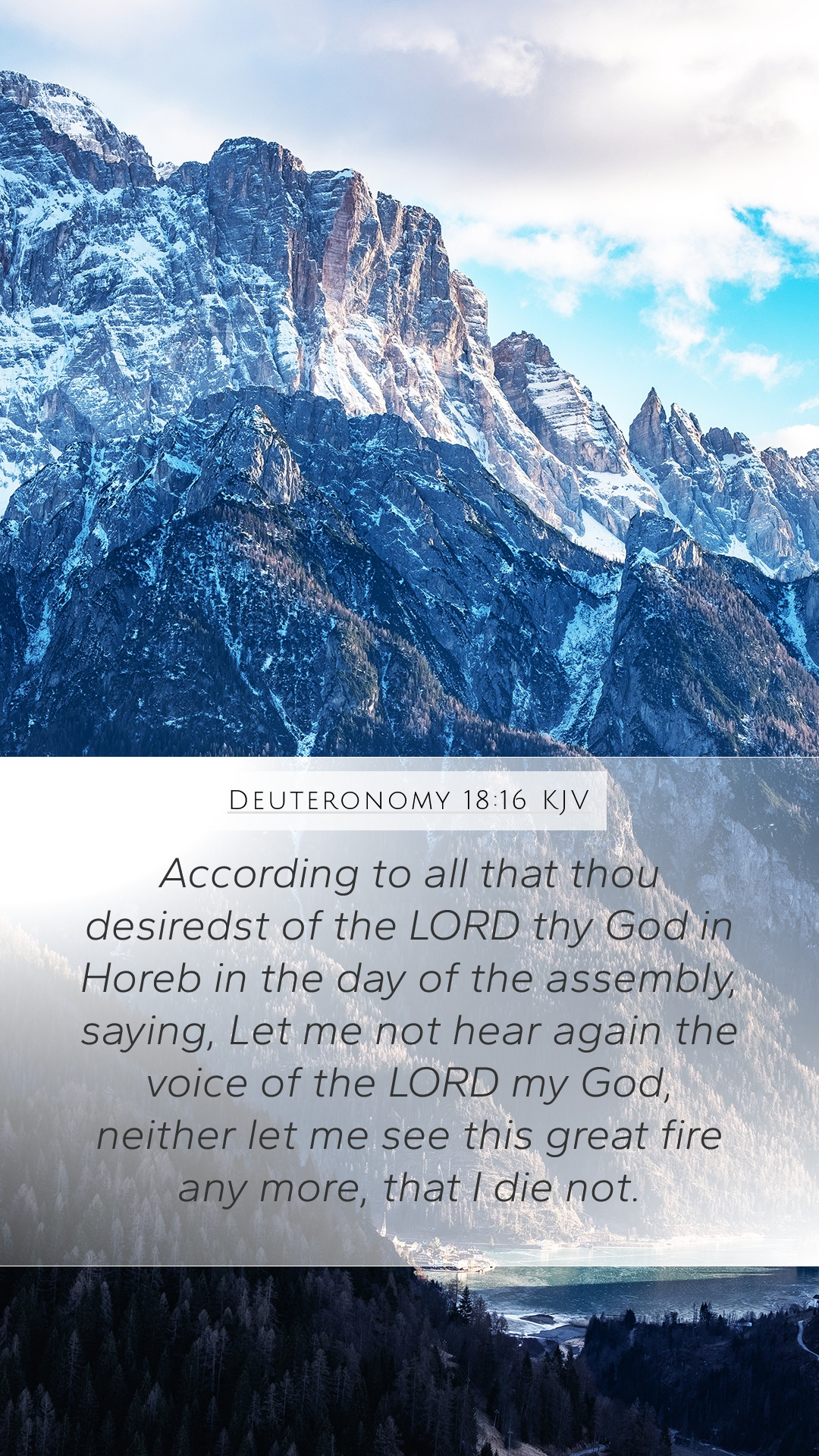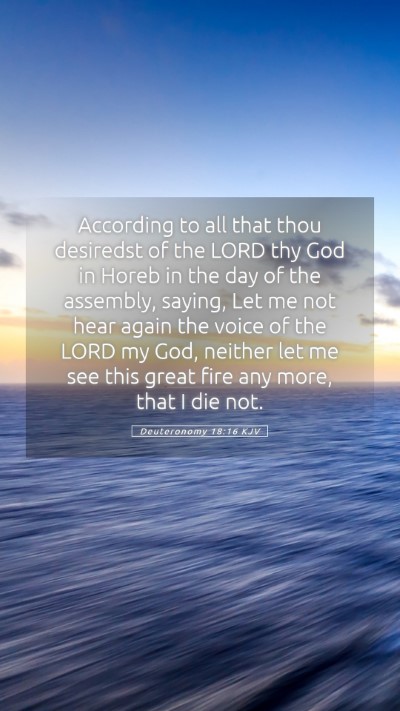Understanding Deuteronomy 18:16
Deuteronomy 18:16 states, "According to all that you asked of the LORD your God at Horeb in the day of the assembly, saying, 'Let me not hear again the voice of the LORD my God, or see this great fire any more, lest I die.'
This verse captures a moment in Israel’s history where the people, overwhelmed by the profound manifestation of God’s presence, implored Moses to act as an intermediary. This plea reflects their fear and reverence towards God's direct communication.
Bible Verse Meanings
Historical Context: The Israelites had just received the commandments from God at Mount Sinai (Horeb), a pivotal event that signified their covenant relationship with Him. Their experience was so intense that they feared for their lives, highlighting the overwhelming holiness of God.
Bible Verse Interpretations
Matthew Henry's commentary emphasizes that this request for mediatorship illustrates the people's recognition of their need for an intermediary due to their unworthiness to approach God directly. This foreshadows the ultimate Mediator, Jesus Christ, who would later bridge the gap between God and humanity.
Albert Barnes reflects on the assembly at Horeb, noting how the people acknowledged their frailty in comparison to God’s majesty. Their desire not to engage directly with God underscores the importance of having a mediator.
Adam Clarke elaborates on the significance of this request. He mentions that the fear of the divine presence was a moment of clarity for the Israelites, confirming their understanding of God’s power and their own limitations.
Bible Verse Understanding
Understanding Deuteronomy 18:16 requires examining the fear of the people. Their request led to God’s promise of a prophet like Moses, indicating His commitment to guiding and preserving His people through a mediator.
Key Themes
- The Nature of God: This verse illustrates God's holiness and the appropriate human response of reverence.
- Mediation: It foreshadows the prophetic role that Moses would serve and ultimately points to Christ as the ultimate Mediator.
- Covenant Relationship: The request demonstrates a pivotal moment in Israel’s covenant life, reinforcing their relationship with God under the governance of His law.
Bible Verse Explanations
This verse makes clear the relationship between God and Israel is one of profound respect and mutual commitment. The fear expressed by the Israelites is not just terror; it reflects an acknowledgment of God's greatness and their own inadequacies.
In-Depth Analysis: The Israelites’ fear of the fire and the voice can be seen as symbolic of God’s holiness - a recurring theme throughout the Old Testament. Their desires signal a turning point where they desire human communication with divine purpose, thus seeking a prophet.
Moreover, this appeal for mediation is consistent with the broader narrative of the Old Testament, which indicates that God desires a relationship characterized by communication and understanding rather than fear alone.
Related Bible Cross References
- Exodus 20:18-21: The people's fear at Sinai.
- Acts 3:22: Reference to the prophet like Moses.
- Hebrews 1:1-2: God speaking through the prophets and then through His Son.
Biblical Exegesis
The exegetical study of this passage reveals profound truths about God’s nature and His desire for human agency through leadership. Interpreting the scripture invites believers to consider how their reverence for God's power influences their spiritual lives today.
Bible Study Insights
This passage is crucial for Bible study groups seeking to understand themes of fear, reverence, and mediation in their spiritual journey. It provides lessons on facing the holiness of God and the role of leadership in faith communities.
Application in Daily Life
Applying the lessons from Deuteronomy 18:16 involves embracing God’s holiness in our lives, recognizing the importance of mediation through Christ, and understanding our own limitations in the light of God’s greatness. It encourages believers to seek relationship over fear and mediatorship over isolation.
Conclusion
In conclusion, Deuteronomy 18:16 serves not only as a historical marker of Israel's journey but also as a theological anchor that continues to resonate with the Christian faith. It challenges readers to reflect on their approach to God and the mediators they rely upon in their spiritual walks.


